Best Duvet Inserts and Comforters – For All Seasons and Budgets
The world's best duvet inserts and comforters for every budget, plus top picks for cooling and warmth, and all you need to know when you’re buying


A duvet insert or comforter is a bedding essential. Layered above a fitted and (when needed) flat sheet, too, it provides the desired level of warmth depending on climate, season, and whether the sleeper tends to be hot or cold. As to the differences between a duvet insert and a comforter and why you might opt for one over another, you’ll find a comparison below.
These are the best duvet inserts and comforters, and I’ve picked a best overall winner, but just below you’ll find the category winners, so you can find the top choice for cooling, warming, and whether you prefer down or want a down alternative.
As Homes & Gardens' specialist sleep expert, I lead a team of expert testers in the search to find the world's best duvet inserts and comforters. Each is assessed against the same criteria: look and feel; thermoregulation; ease of care; and the all-important price. You might be able to save some money when you shop during the bedding sales.
Best Duvet Inserts and Comforters − at a Glance
Below, you'll find a bite-sized summary of each insert, outlining who it suits, what it costs, and the most important pros and cons. Don't worry if you come across any unfamiliar terms: you can always cross-reference against my bedding jargon buster.
To learn more about a particular insert or comforter, keep scrolling, or press 'read more below' to shortcut to that section. There, I've listed the need-to-know specs, including fill type and density, before diving into the details of our testing experience.
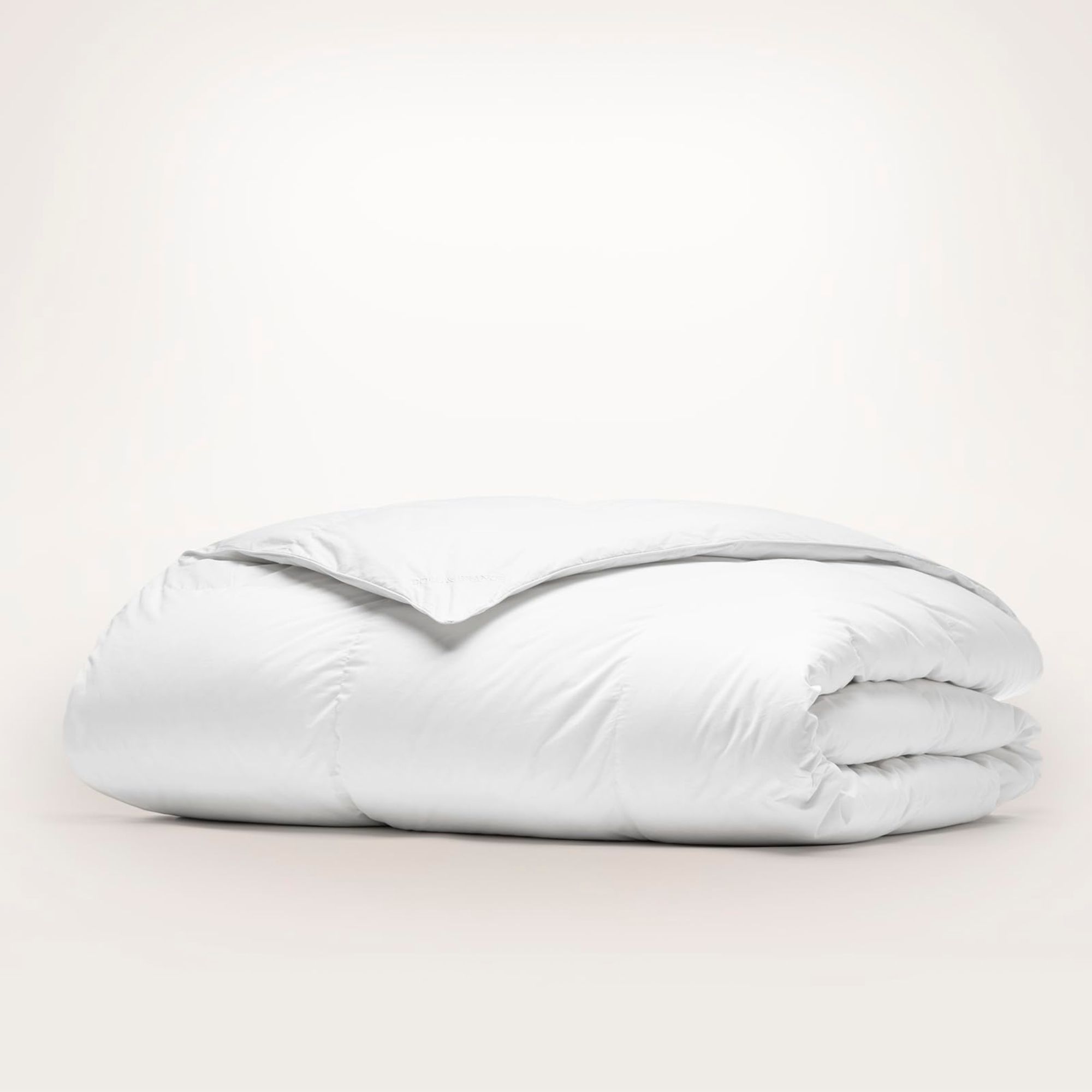
Our reigning champion for the title of 'best duvet insert' comes in three weights to suit every sleeper. Each insert is wrapped in a cotton shell that's soft on your skin and cool to the touch.
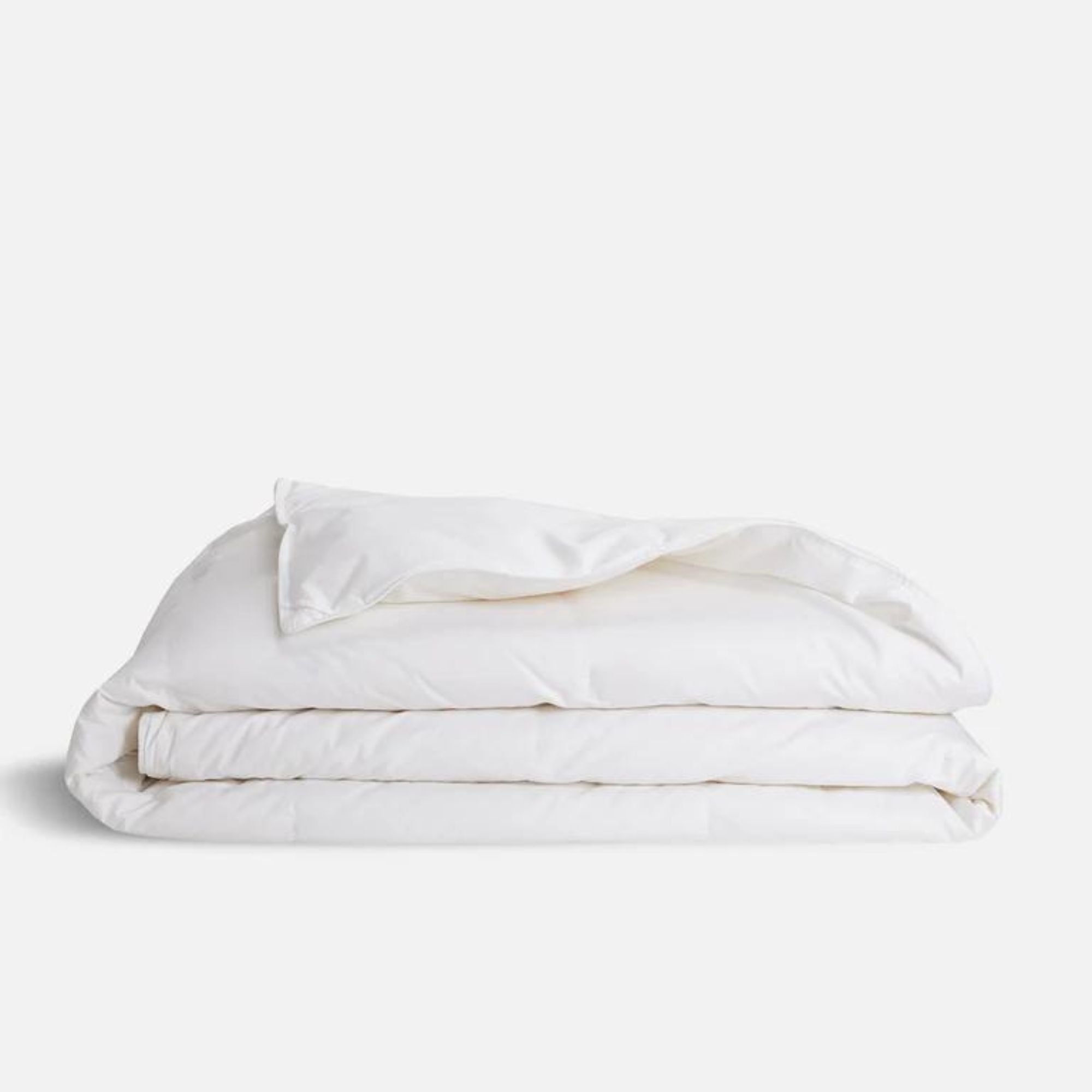
The Brooklinen Down Comforter is filled with fluffy down clusters, rather than individual feathers, to maximize warmth and minimize waste.
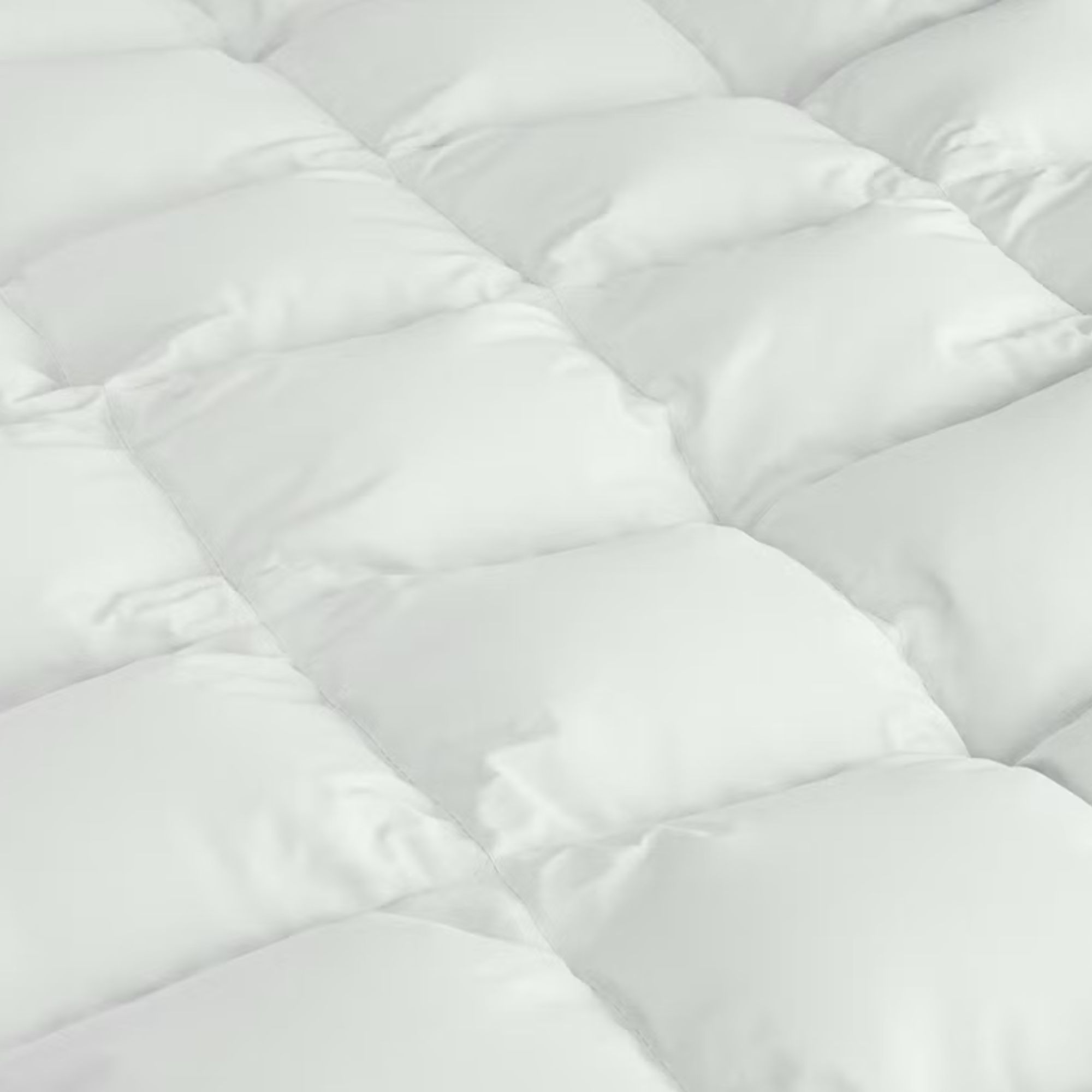
Filled with breathable lyocell, this comforter is plush and cozy, whilst being breathable and hypoallergenic, making it a great choice for allergy sufferers.
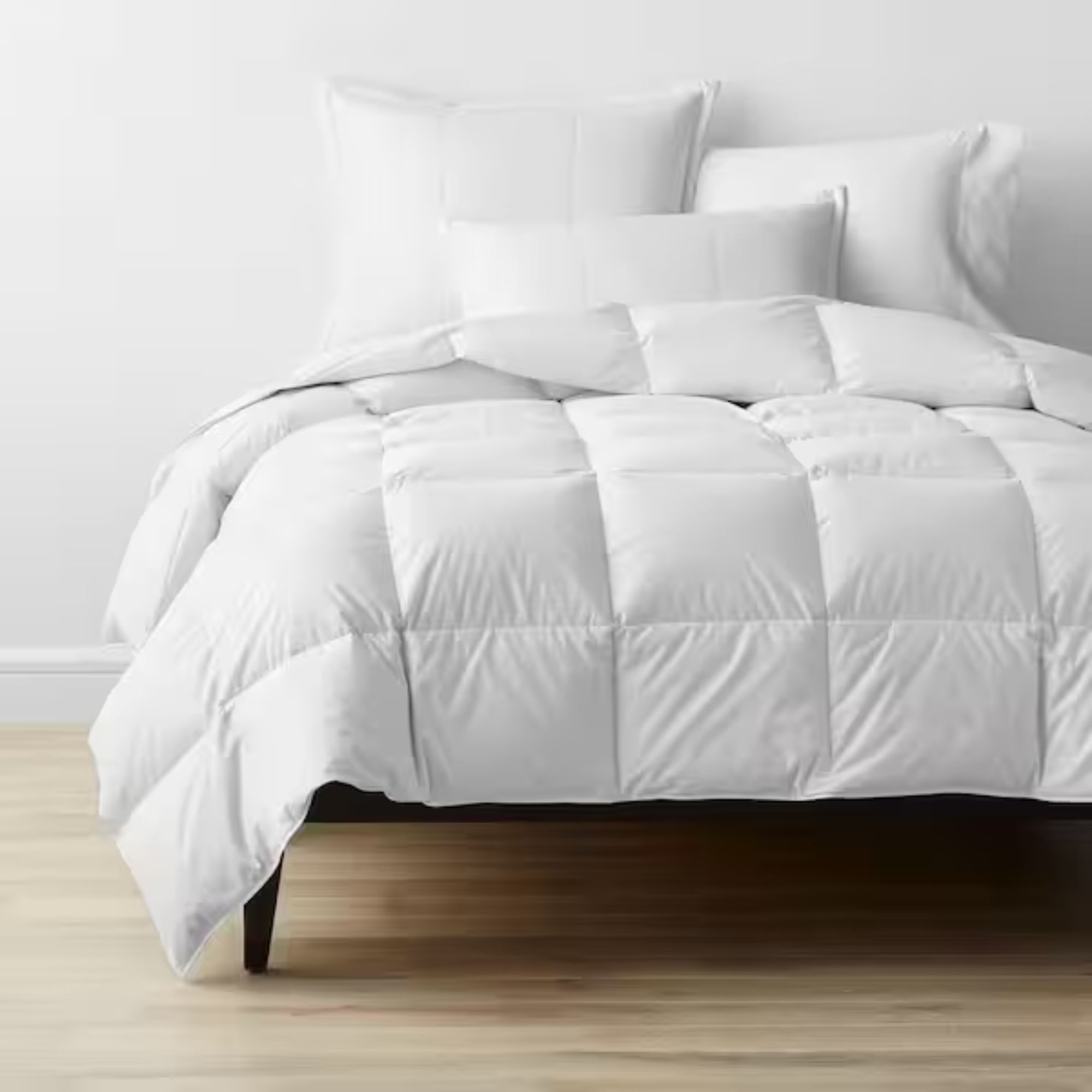
Tester, Alex Temblador, used this cooling comforter at her home in the middle of Texas, and she couldn't believe how cool it kept her.
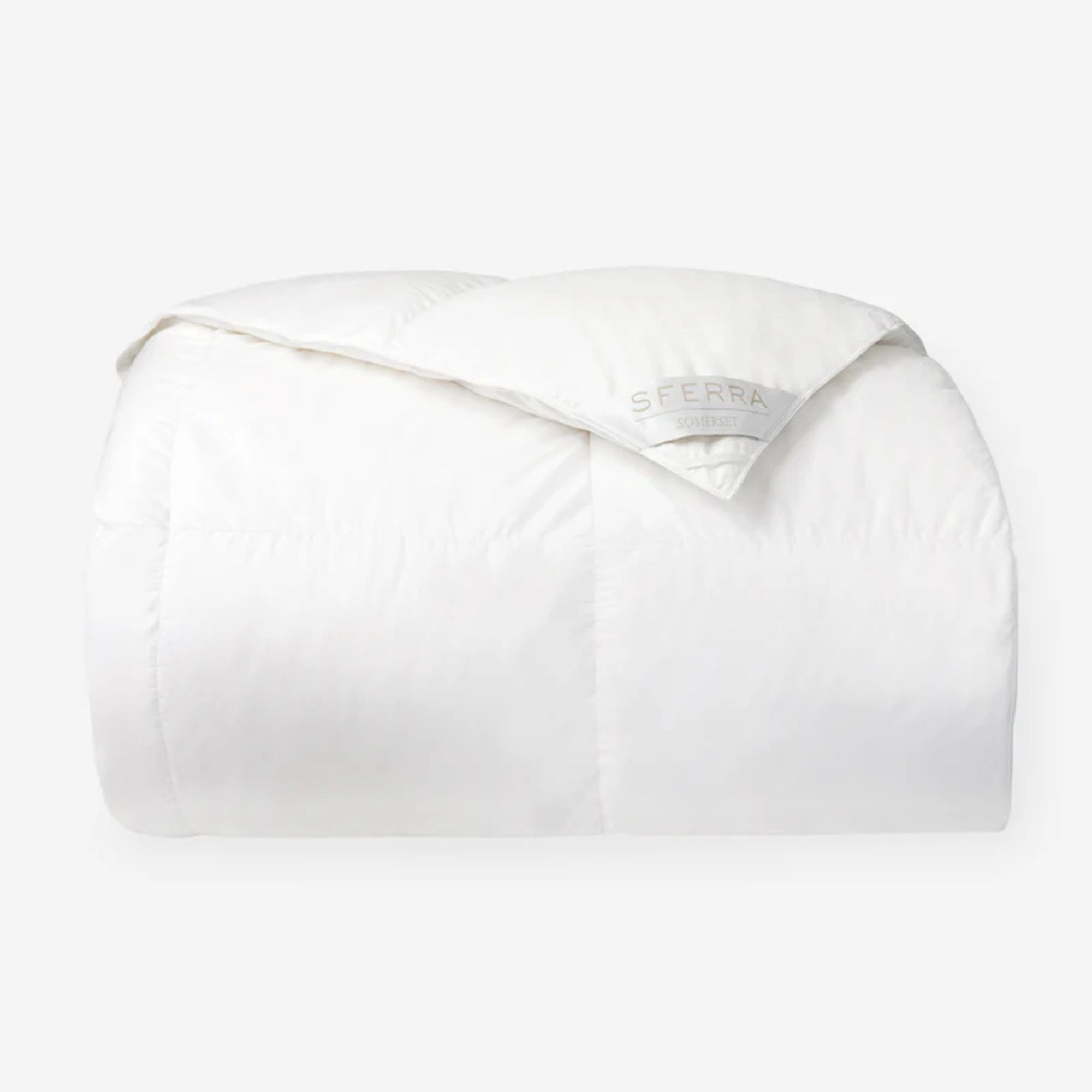
Admittedly, this warm comforter is very expensive, but I like to think of it as an investment. It's filled with responsibly sourced down, and available in three densities to suit a range of climates and sleepers.

Filled with alpaca wool and covered in GOTS-certified cotton, this duvet insert got the thumbs up from our tester, though she'd have preferred a lighter weight.
The Best Duvet Insert Overall
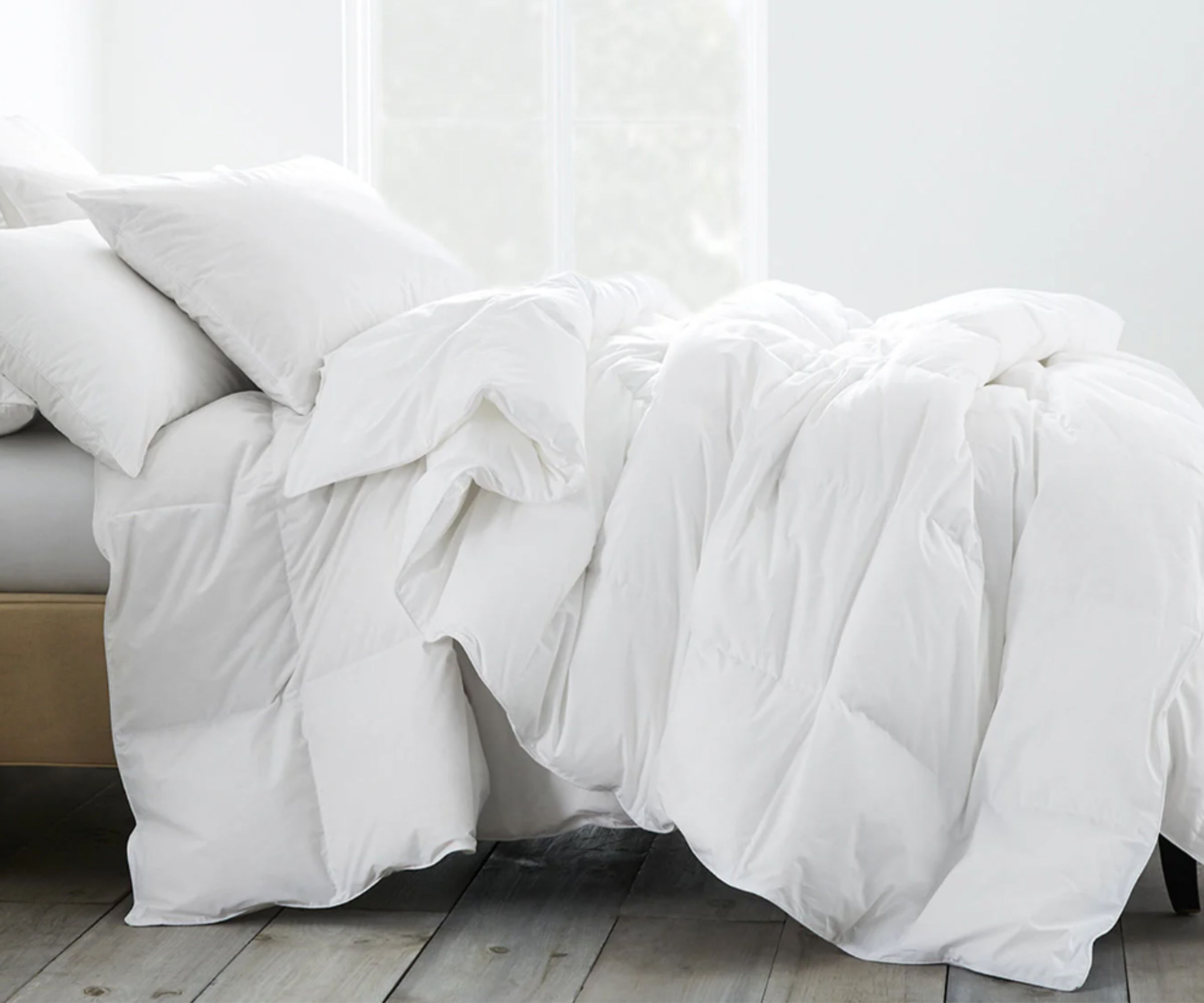
Specifications
Reasons to buy
Reasons to avoid
The Boll & Branch Down Duvet Insert comes in three warmth weights to suit all seasons and sleep styles. Our tester, Meg St-Esprit, tried the Midweight to suit the moderate climate in Pittsburgh, where she lives, and found it to be 'a nice compromise between summer blankets and heavy winter duvets.'
Crucially, while Meg loves the feel of sinking into a luxurious down duvet, she suffers from allergies, often exacerbated by down. However, she says, 'despite my initial concerns, for the 30 nights that I tested this duvet insert, I did not experience any of the symptoms I typically get when mites are present'. This is thanks to a special triple washing process, which eliminated the issue.
It also meets International Down Standards [IDS], with the down being sourced from certified American farms, which brings peace of mind to those who have concerns about animal welfare, although vegans may prefer to seek out a down alternative.
Meg also commented that the duvet held up well to washing and that the 'evenly distributed fill makes each night feel like a staycation in a fancy hotel.'
Admittedly, the Boll & Branch Down Duvet Insert is on the more expensive side: we're talking more than $400 for a Lightweight Queen. If you're looking for a down comforter, but you're working with a tighter budget, then I suggest you shop the Brooklinen Down Comforter instead, which is around $100 less.
Read the full review: Boll & Branch Down Duvet Insert
Attribute | Notes | Rating (out of 5) |
|---|---|---|
Look and feel | Naturally cozy with substantial heft; available in multiple weights | 5 |
Thermo-regulation | Tends to trap a little heat, but overall worked well | 4 |
Ease of care | Machine-washable and dryer-safe | 5 |
Price | On the more expensive side | 3 |
The Best Down Comforter

Specifications
Reasons to buy
Reasons to avoid
There's a difference between down clusters and duck feathers. Clusters are the fluff, while feathers have the filament. Where most down comforters are filled with individual feathers, which can poke through the shell to scratch your skin, the Brooklinen Down Comforter is stuffed with down clusters for a fluffier feel. It's my favorite duvet insert for a nice, lofty bedspread.
As down comforters go, this one is pretty animal-friendly. Brooklinen sources its down sustainably from Canadian farms and meets the Downmark standard for quality assurance (that's not quite as big a deal as the International Down Standard, but it counts for something). Still, if you prefer to purchase vegan products, you'd be better off with the best sustainable comforter.
The Brooklinen Down Comforter comes in Lightweight, All-Season, and Ultra-Warm to suit every style of sleeper. Where the Boll & Branch Duvet Insert comes up pretty heavy, the Brooklinen Down Comforter feels pretty light: I'd only recommend the Lightweight option for seriously hot sleepers or summer use. I tried the All-Season insert, which still felt a little thin at the start of spring and end of summer, but I'm finding it much more comfortable now we're heading towards winter.
Read the full review: Brooklinen Down Comforter
Attribute | Notes | Rating (out of 5) |
|---|---|---|
Look and feel | Light and fluffy with plenty of natural loft | 5 |
Thermo-regulation | Available in multiple weights to suit every climate | 5 |
Ease of care | Spot clean recommended, dry clean if needed | 2 |
Price | Comfortably middle-of-the-pack | 4 |
The Best Down Alternative
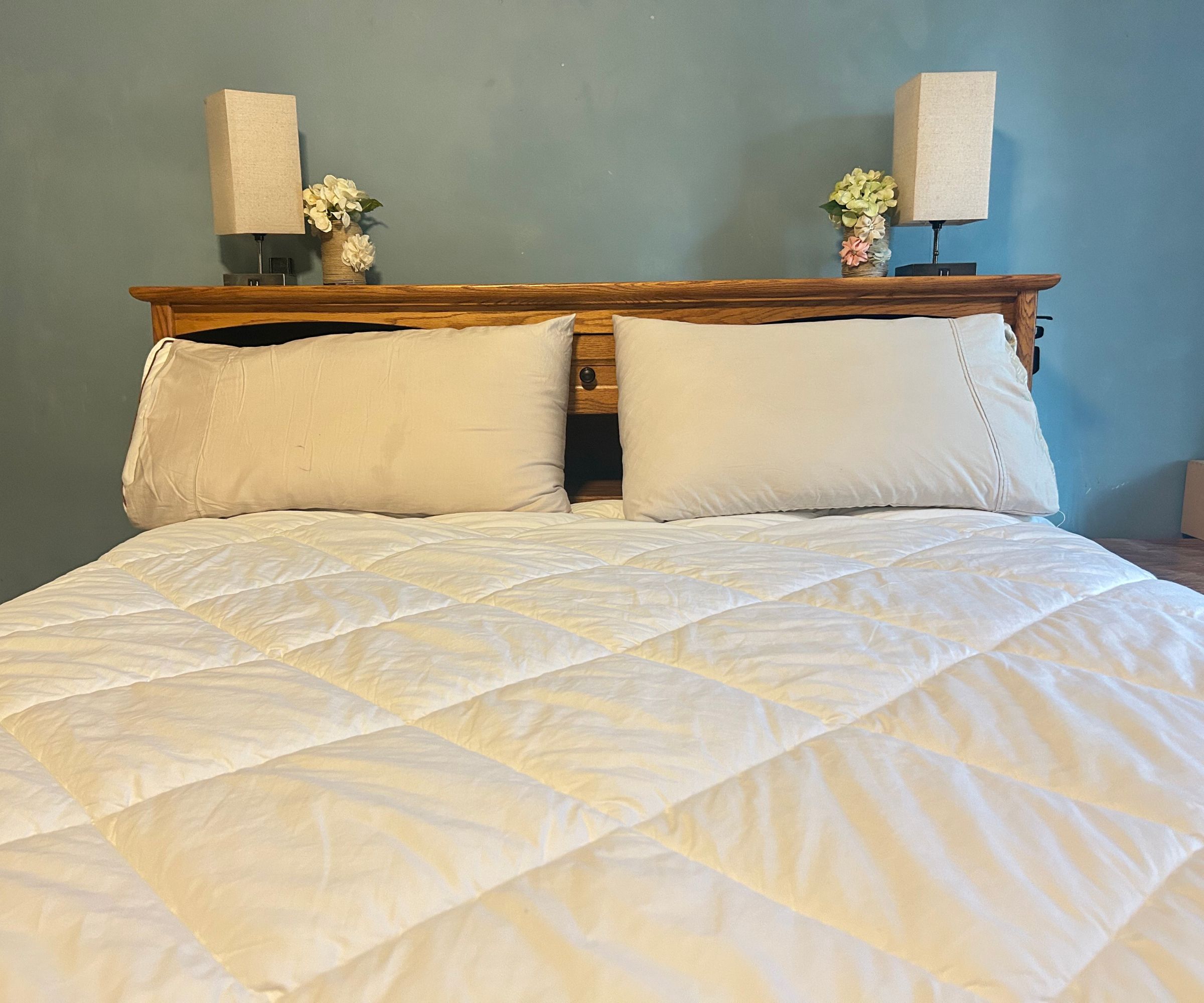
Specifications
Reasons to buy
Reasons to avoid
Our tester, Meg St-Esprit, is an allergy sufferer, so finds down difficult to sleep with, however, she admits that she's struggled to find an alternative that replicates the squish and comfort factor. Having opted for the heavyweight for chilly winter nights, Meg says, 'I loved the heft of the comforter right away.'
The Saatva Down Alternative Comforter is filled with 3D down alternative fibers, combined with thermoregulating lyocell, which Meg said was breathable and didn't leave her feeling clammy in the mornings, despite the weight.
One of the downsides to down alternatives is that they don't hold up well to washing, but Meg said this wasn't the case with the Saatva Down Alternative Comforter, and that it 'retained its luxe feel even after multiple wash cycles.'
While one of the reasons for choosing a down alternative may be that it's usually a more affordable option, the price of this comforter is comparable to down, at $315 for an all-year weight. However, Meg says, 'I am a firm believer in investing in good products that last for years, and I think this is a smart buy that will still feel like a smart buy in five years'. If you're looking for a more budget-friendly down alternative, we also recommend the Buffy Cloud Comforter, which is an eco-friendly option, too.
Read the full review: The Saatva Down Alternative Comforter
Attribute | Notes | Rating (out of 5) |
|---|---|---|
Look and feel | A plush alternative to real down | 5 |
Thermo-regulation | Breathable, even with the heavyweight option | 4 |
Ease of care | Machine-washable but takes a few cycles to dry | 4 |
Price | On the expensive side for a down alternative | 3 |
The Best Cooling Comforter
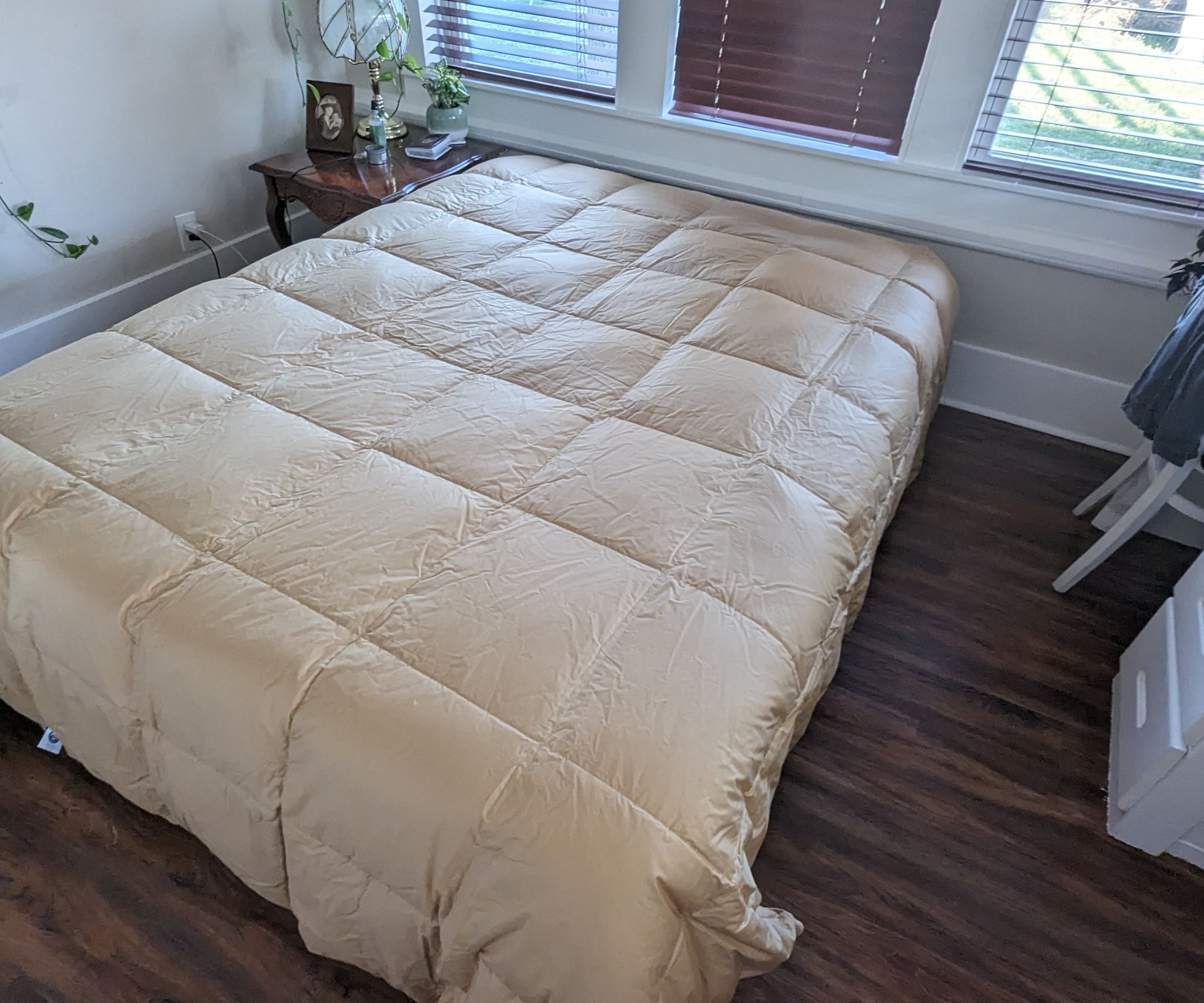
Specifications
Reasons to buy
Reasons to avoid
The LaCrosse Premium Down Comforter comes in four warmth weights to suit every style of sleeper and sort of climate. Our expert tester, Alex Temblador, tried the Light Warmth Comforter and found it suited her needs as a hot sleeper in a hundred-year-old house with terrible insulation in North Texas.
'Although I struggle to sleep in the heat, I find that I still need a layer to apply some gentle pressure,' says Alex. 'The LaCrosse Premium Down Light Warmth Comforter weighed just enough to keep me comfortable without trapping any excess heat'.
A lot of the cooling comforters on this list only come in classic white. Luckily, The Company Store stocks the LaCrosse Premium Down Light Warmth Comforter in all sorts of shades, from thyme green to smoke blue, to complement every color palette.
I like pretty much everything about the LaCrosse Premium Down Light Warmth Comforter. Sure, it's on the more expensive side, but that's the price you pay for premium down, ethically sourced and certified to meet the Responsible Down Standard. It's worth flagging, though, that even the best down comforter is unsuitable for vegan shoppers or anyone with a feather allergy. You'd be better off with a down alternative duvet insert, such as the Saatva Down Alternative Comforter.
Read the full review: The LaCrosse Premium Down Light Warmth Comforter
Attribute | Notes | Score (out of 5) |
|---|---|---|
Look and feel | Natural loft you only get from real down | 5 |
Cooling | Suitable for the height of summer in the South | 5 |
Ease of care | Machine-wash cold, tumble-dry low | 4 |
Price | Reasonably priced for down | 4 |
The Best Warm Duvet Insert
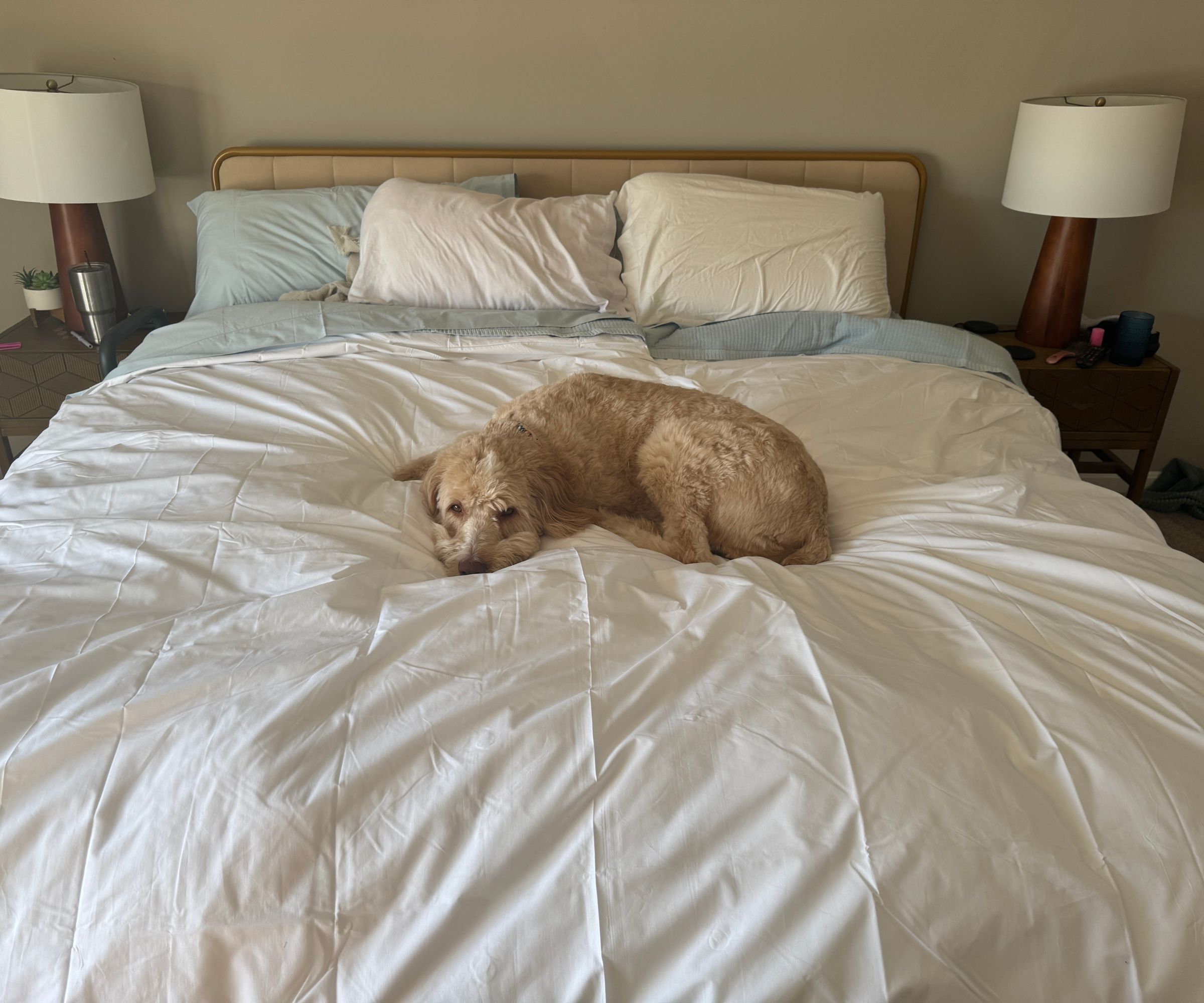
Specifications
Reasons to buy
Reasons to avoid
Not everyone is a hot sleeper. As we head into winter, you might appreciate one of the best warm comforters to keep you cozy. Our expert tester, Alex Frost, sampled the Sferra Somerset Duvet back at the start of the year, and she's still raving about it. If it weren't for the prohibitive price, she'd get this duvet insert the full five stars.
Lightweight and lofty, but cozy underneath, the Sferra Somerset Duvet is suitable for all seasons. 'As much as I want to be warm under my duvet, I don't want to overheat,' says Alex. 'I had worried I might get too hot under a down duvet, especially with my space heater blaring in winter, but I never felt sweaty or uncomfortable.'
'If you're fed up with cheap comforters and duvets that only last a few years and make you feel too hot or too cold, then the Sferra Somerset Duvet might be for you,' says Alex. 'This is a splurgy item that might make the difference between hotel-quality comfort and less luxurious sleep.'
Alex acknowledges that it's impossible to review the Sferra Somerset Duvet without mentioning the price, but: 'I can't overstate how well I slept with this comforter. Four months into testing, I feel confident that the look and feel of the down will hold up over the years. FYI: Sferra does offer a 600+ goose-down fill with its Buxton Duvet line for roughly half the cost of the Somerset Duvet.'
Read the full review here: The Sferra Somerset Duvet
Attribute | Notes | Rating (out of 5) |
|---|---|---|
Look and feel | Available in multiple densities; generous natural loft | 5 |
Thermo-regulation | Errs on the warmer, weightier side | 4 |
Ease of care | Machine-washable and dryer-safe | 4 |
Price | Very expensive | 3 |
The Best Organic Duvet Insert
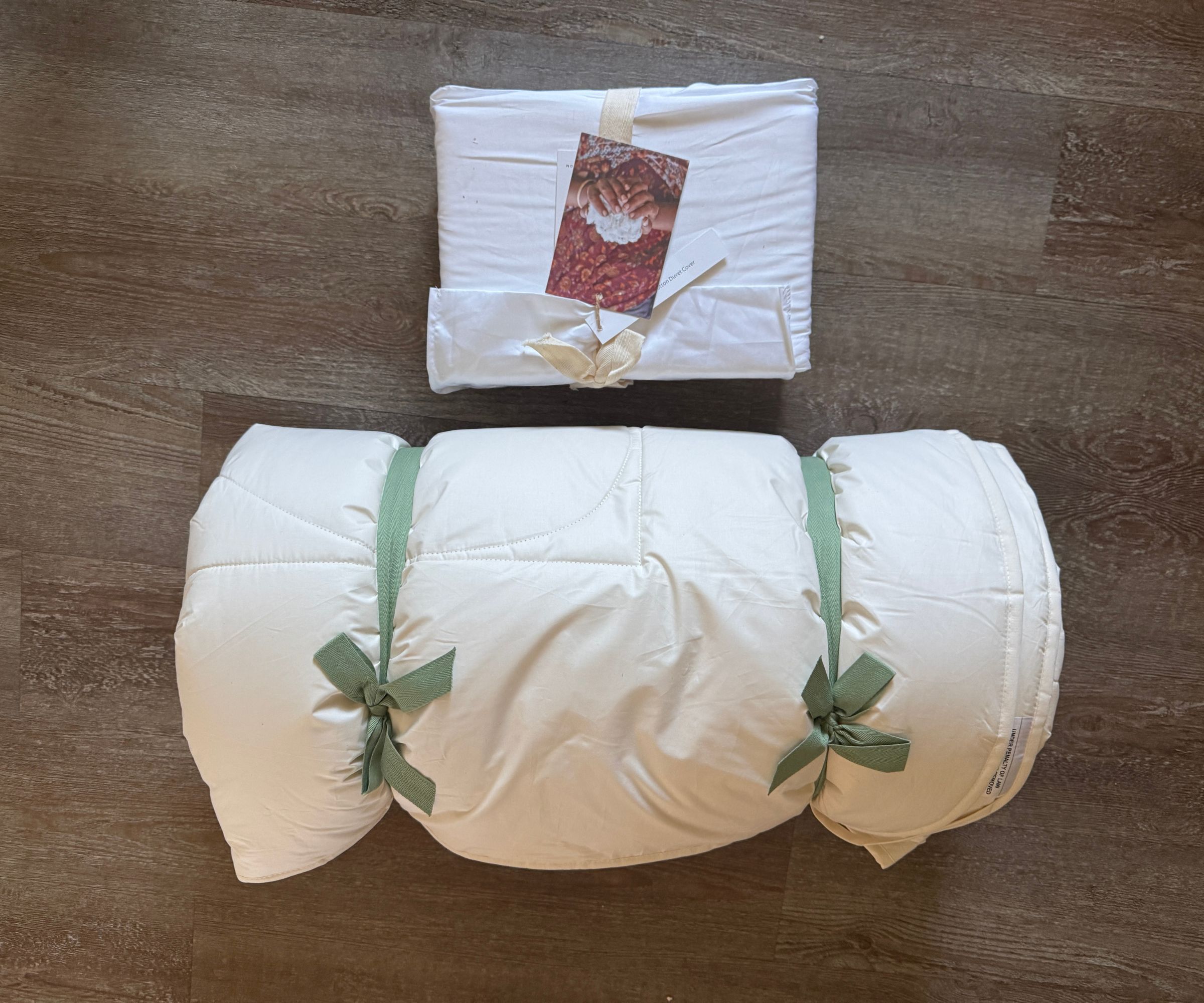
Specifications
Reasons to buy
Reasons to avoid
For eco-conscious customers looking to try something new, I recommend alpaca wool. If you're concerned about animal welfare, there's no need to be with this product and shearing the alpacas doesn't hurt them − in fact, getting rid of all that excess wool helps their skin breathe.
Alpaca wool is also naturally antimicrobial, so it should slow the spread of bacteria, mold, and mildew while keeping bed bugs and dust mites at bay. It's also naturally breathable, thermoregulating, and moisture-wicking.
Unlike synthetic fills or ultra-light down, our tester, Alex Frost, describes this alpaca wool duvet insert as 'heavy and comfortable, fluffy and cozy,' and that it 'applied a good amount of pressure to your whole body in the night, which some might find particularly comforting.'
While the Avocado Alpaca Duvet Insert is neither machine-washable nor dryer-safe, it's relatively easy to clean. Avocado recommends spot-cleaning to tackle smaller spills or stains and hanging the comforter in direct sunlight to restore freshness.
Read the full review here: The Avocado Alpaca Duvet Insert
Attribute | Notes | Rating (out of 5) |
|---|---|---|
Look and feel | Plush and luxurious | 5 |
Thermo-regulation | Naturally moisture-wicking but hot sleepers may need something cooler | 4 |
Ease of care | Spot clean only | 3 |
Price | Mid-range for a premium fill | 4 |
Best Duvet Inserts and Comforters – Side by Side
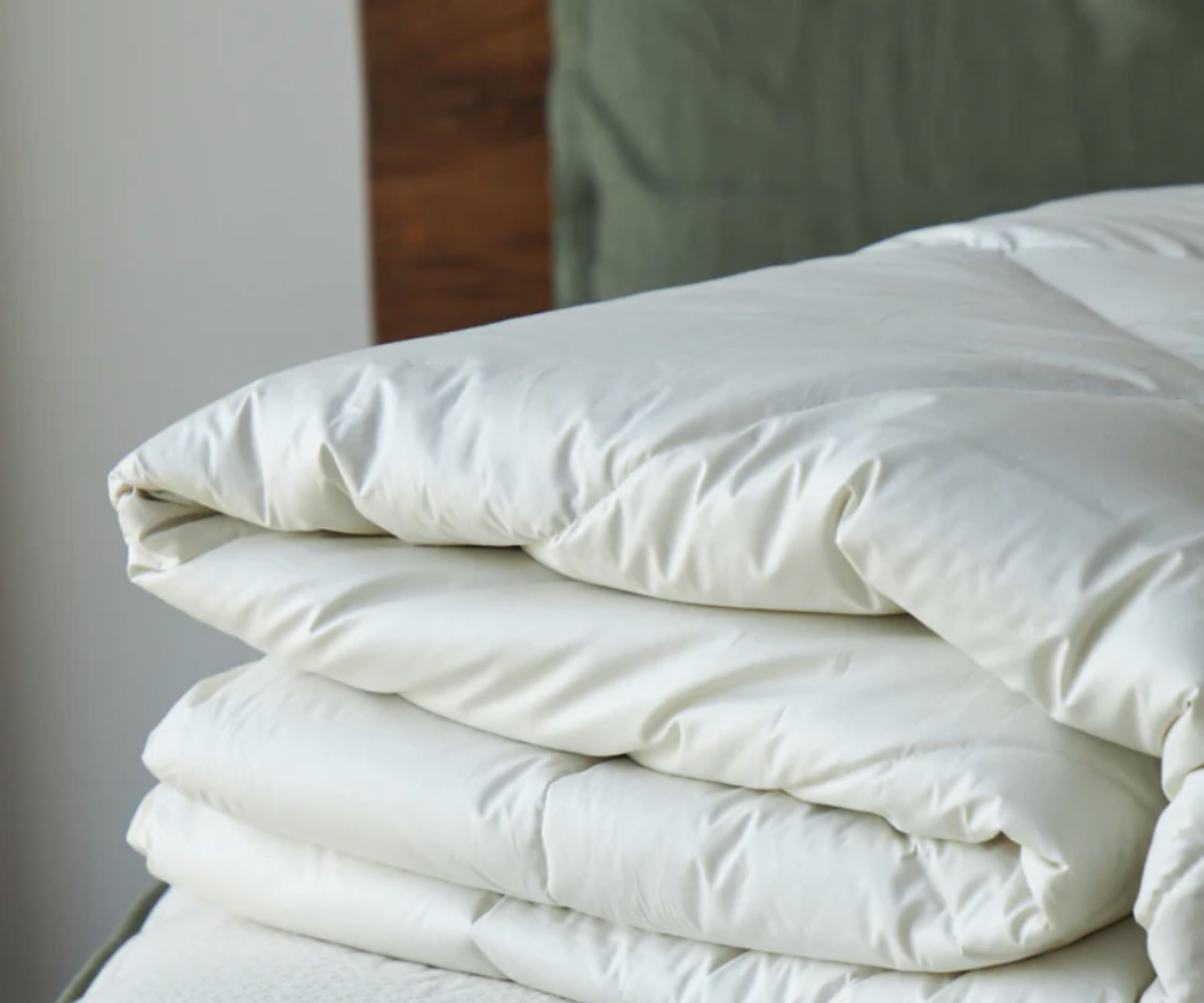
The Avocado Alpaca Duvet Insert is naturally breathable and moisture wicking
| Header Cell - Column 0 | Sizes | Density | Fill | Shell |
|---|---|---|---|---|
Boll & Branch Down Duvet Insert | Twin/Twin XL, Full/Queen, King/California King | Lightweight, Midweight, Ultraweight | IDS certified down | Cotton |
Brooklinen Down Comforter | Twin/Twin XL, Full/Queen, King/California King | Lightweight, All-Season, Ultra-Warm | DOWNMARK certified down | Cotton sateen |
Saatva Down Alternative Comforter | Twin/Twin XL, Full/Queen, King/California King | Lightweight, All-year, Heavyweight | 3D down alternative and sustainable lyocell | Organic cotton |
LaCrosse Premium Down Light Warmth Comforter | Twin/Twin XL, Full/Queen, King/California King | Light, Medium, Extra, Ultra | RDS certified down | Cotton twill |
Sferra Somerset Duvet | Twin, Queen, King | Light, Medium, Heavy | Polish white goose down | 100% German-woven cotton sateen |
Avocado Alpaca Duvet Insert | Twin/Twin XL, Full/Queen, King/California King | Lightweight, All-Season | Alpaca fiber | Organic cotton |
Best Places to Buy Duvet Inserts and Comforters
The best places to buy duvet inserts and comforters aren't necessarily specialist sleep stores. If you know where to look, you can find down and down alternative options in a range of warmth and weights to suit every season and sleeper.
I've scoured the sites of major home retailers and combed through our back catalog of reviews to bring you my edit of the best places to buy comforters.
- Amazon: You'll find a big range of duvets and comforters, from Amazon Basics to brand names across all budgets. You can filter by fill and cover material, although you'll need to check reviews to avoid low-quality products.
- Boll & Branch: Luxury comforters and duvet inserts made from ethically sourced down, in a good choice of weights, but they do come at a higher price tag.
- Brooklinen: Offers something for every sort of sleeper, with multiple weights and warmth levels, as well as corner looks for attachment to duvet covers. It's worth waiting for the sales to get the best prices.
- The Company Store: The place to shop for comforters in classic colors, prints, and patterns in down and down alternatives and weights to suit all climates.
- Woolroom: Wool is one of nature's great thermoregulators, and it's especially well suited for anyone who suffers from night sweats. It's also hypoallergenic.
- Saatva: This luxury brand offers American-made mattresses and comforters in down and high-quality down alternatives in a full range of sizes and three weights. It's a pricier choice but renowned for its quality.
- Avocado: One of the leaders in organic bedding, Avocado duvets and comforters are made with natural, non-toxic fills from down to silk and alpaca wool, with the highest sustainability certifications.
How We Test Duvet Inserts
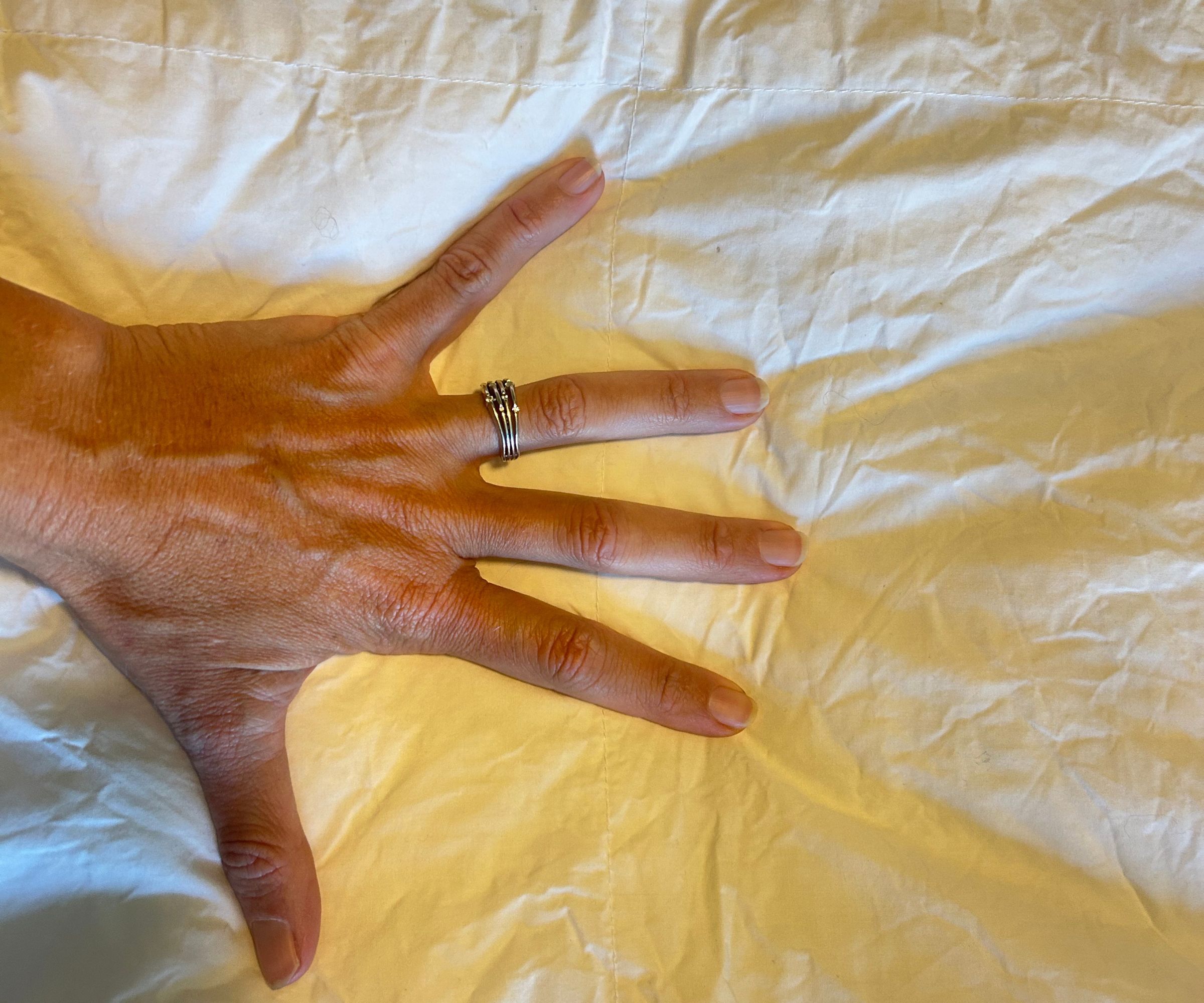
Tester, Meg, trying out the Boll & Branch Down Duvet Insert
Homes & Gardens' team of product testers represents a wide range of ages and sleep styles, and lives all across the country, from hot and humid cities in the South to cooler climes in the Pacific Northwest. Each of us sleeps under comforters for a minimum of 30 days in our own homes to give an accurate indication of long-term performance. To learn more about how we test comforters at Homes & Gardens, consult our expert guide.
We assess each duvet insert or comforter against the same criteria: look and feel, cooling, and ease of care. To assess comfort, we lie beneath the comforter and consider the weight of the fill, watching out for any sharp feather filaments or clumps of fiberfill. The best duvet inserts are lofty and full-looking, rather than thin and flat. To assess cooling, we switch off our AC and sleep beneath the comforter, making note of any nights we wake up in a sweat. We follow the cleaning instructions on the care tag to wash and dry the comforter, monitoring how it feels and how it looks before and after each wash.
We also consider the practical aspects of buying a duvet insert or comforter, from the range of sizes available to how it looks on the bed. We like to compare our findings against verified reviews to get a better indication of long-term use. Finally, we bring it all back to the price of the product to help you determine value for money.
Our Expert Team of Product Testers

As our resident Sleep Editor, Emilia leads a team of expert testers across the country to rank and review the best bedding. As a hot sleeper, Emilia looks for duvets and comforters that will keep her cool and comfortable.

Alex is one of our most prolific sleep product testers. She sleeps warm but likes to feel cozy, so looks for lightweight and breathable duvet inserts that offer comfort without the clammy feeling.

Alex is one of our more prolific sleep product testers, with three mattress reviews, a mattress topper review, a comforter review, and a pillow review under her belt. As someone who suffers from recurring neckache, Alex appreciates the pressure relief of memory foam.

As a travel journalist, Meg has slept on a whole range of mattresses and beds, so she knows what makes for a good night's sleep. She reviews sleep and bedding products for Homes & Gardens, giving her honest and experienced take.
How to Choose a Duvet Insert
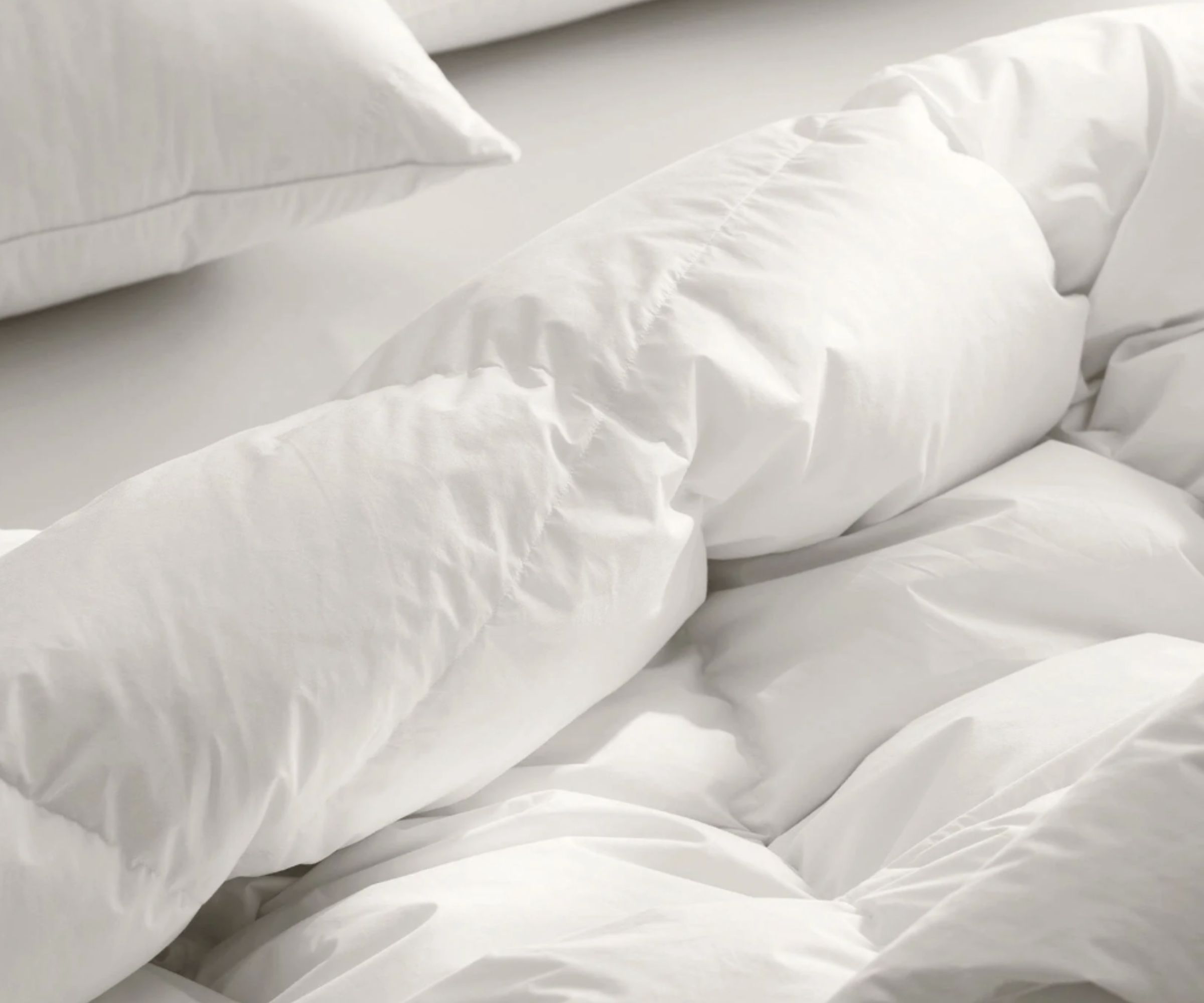
Our overall pick, the Boll & Branch Down Duvet Insert
Select Your Fill Type
There are two categories of duvet fill: natural and synthetic. Natural duvets feel lighter and fluffier: they're better for thermoregulation, but they're less suitable for vegans or anyone who suffers from allergies.
- Down: made with the fluff beneath feathers, down duvets feel light and airy, and they offer the best level of warmth. You might read about Hungarian, Swedish, or Canadian down, which keeps sleepers warm in cold weather. I recommend down duvets for cool sleepers and winter weather.
- Feather: heavier than down, a feather duvet is filled with both quills and barbs (the filament of the feather). These duvets are stronger, more robust, and often less expensive, creating weight and warmth for less.
- Silk: If you're allergic to feathers, but you still want to sleep under a natural duvet, then silk could be a good option. Like down, it's lightweight and thermoregulating, but it's often more expensive.
- Wool: another natural alternative, wool is an excellent moisture-wicking material. According to the Woolroom Clean Sleep Report 2024, wool can hold up to 33% of its weight in water (or sweat). It's highly absorbent to keep your bed and body dry.
- Synthetic fills: These are better for sleepers with sensitive skin, but they lack a little of the natural loft that makes a beautiful bedspread.
You may also have heard the terms microfiber and hollowfiber used in relation to duvet fillings – here's what they mean to help you buy in-the-know:
- Microfiber: filled with extra-fine fibers, these duvets feel ultra-lightweight.
- Hollowfiber: these filaments feel thicker, more wiry, and durable than microfiber. They're often coated with a hypoallergenic treatment to soothe sensitive sleepers.
Wool vs Down Duvet Inserts and Comforters
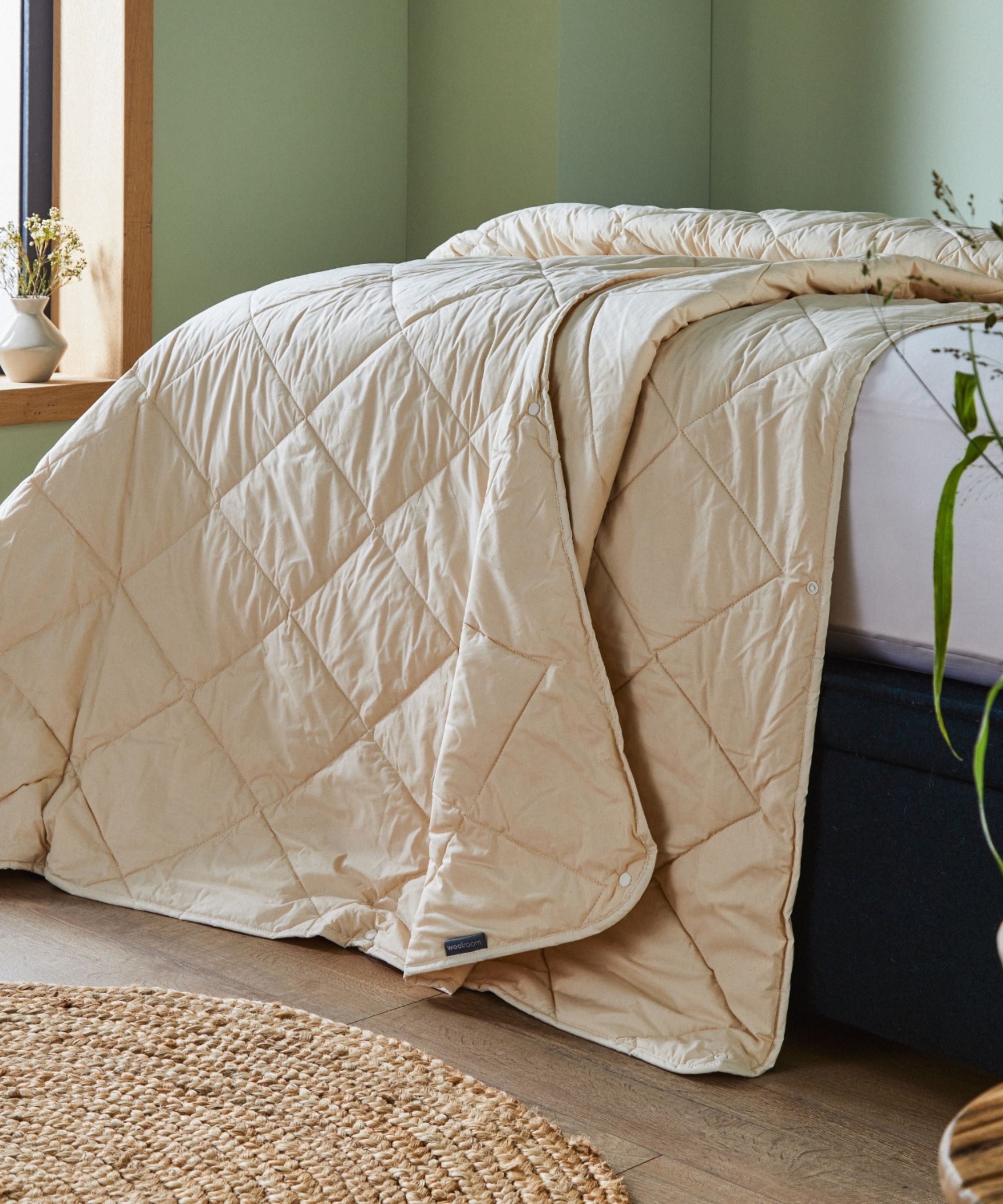
Wool duvets tend to feel a little flatter and less plush than down
The wool vs down debate sets thinner and flatter wool against light and fluffy down. Here are the distinctions that will help you choose the best fill for you.
Wool is natural, breathable, and regulates temperature well to keep you warm in winter and cool in summer. It’s also naturally hypoallergenic and resistant to house dust mites, so good for those with allergies.
I recommend down, on the other hand, if you need a warming duvet insert or comforter, or live in a cooler climate. Down is also breathable and, as I’ve mentioned, is light and has great loft and softness. However, it may not be the best choice for those with allergies and asthma, as it can harbor dust mites unless it has been treated to be hypoallergenic, such as the Boll & Branch Down Duvet Insert, which is triple-washed to reduce allergens.
Down vs Down Alternative Duvet Inserts and Comforters
Down vs down alternative is a head-to-head you might want to consider. These are the differences.
Down is created from the fluffy layer beneath the feathers of ducks and geese that provides the birds with insulation. It’s warm and breathable, but it can be unsuitable for those with allergies and asthma.
Down alternatives include wool, but they’re typically synthetic. If you want a less expensive duvet insert or comforter, it’s likely to be the preferable option, and, of course, vegans won’t want real down. It can prove an allergy-friendly pick.
How to Choose the Right Tog Rating
You might see the term 'tog' plastered over the duvet packaging or printed on the care tag. 'Tog' stands for 'Thermal Overall Grade' and it's measured on a scale from 1 to 15.
When choosing a duvet tog, there are a few factors to consider: the outdoor temperature or, the typical weather patterns in your region, and the indoor temperature, or the warmth of your bedroom.
Consider your own internal temperature next. This is simpler than it sounds. Just stop and think about how you sleep − whether you tend to wake up feeling warm or cool, and if you ever suffer from night sweats or hot flashes.
When you combine these readings, you should get a good indication of what sort of duvet tog would suit your sleep needs. Cool sleepers who sleep in a warm bedroom might only need a mid-weight duvet, between 7 and 11 tog, while cool sleepers who live in colder climates might be better served by an ultra-warm duvet, with a tog rating of 13 or more.
You might like to dress a bed seasonally, too, a lighter duvet for summer (somewhere between 1 and 7 tog) and a warmer one for winter (10 tog or above). But if you don’t want to have to swap, you could opt for an all-season weight (from 7 to 10 tog) or buy an adjustable duvet to see you through all four seasons. This comprises multiple layers connected by snaps. Simply pull apart the layers when it's warm out and put them back together when the weather turns.
Choose the Right Size
The average duvet insert or comforter comes in all the standard sizes, from Twin to California King, but they're designed to be longer and wider than your mattress. Most manufacturers follow the 12-16 rule: that a duvet should be 12 inches longer and 16 inches wider than the mattress.
If you want to create an oversized drape, you can always size up. If you share a bed with a partner, but you'd rather sleep with separate duvets, then I suggest you shop for two Twin XLs rather than one Queen.
Choose the Best Duvet Insert or Comforter for Winter
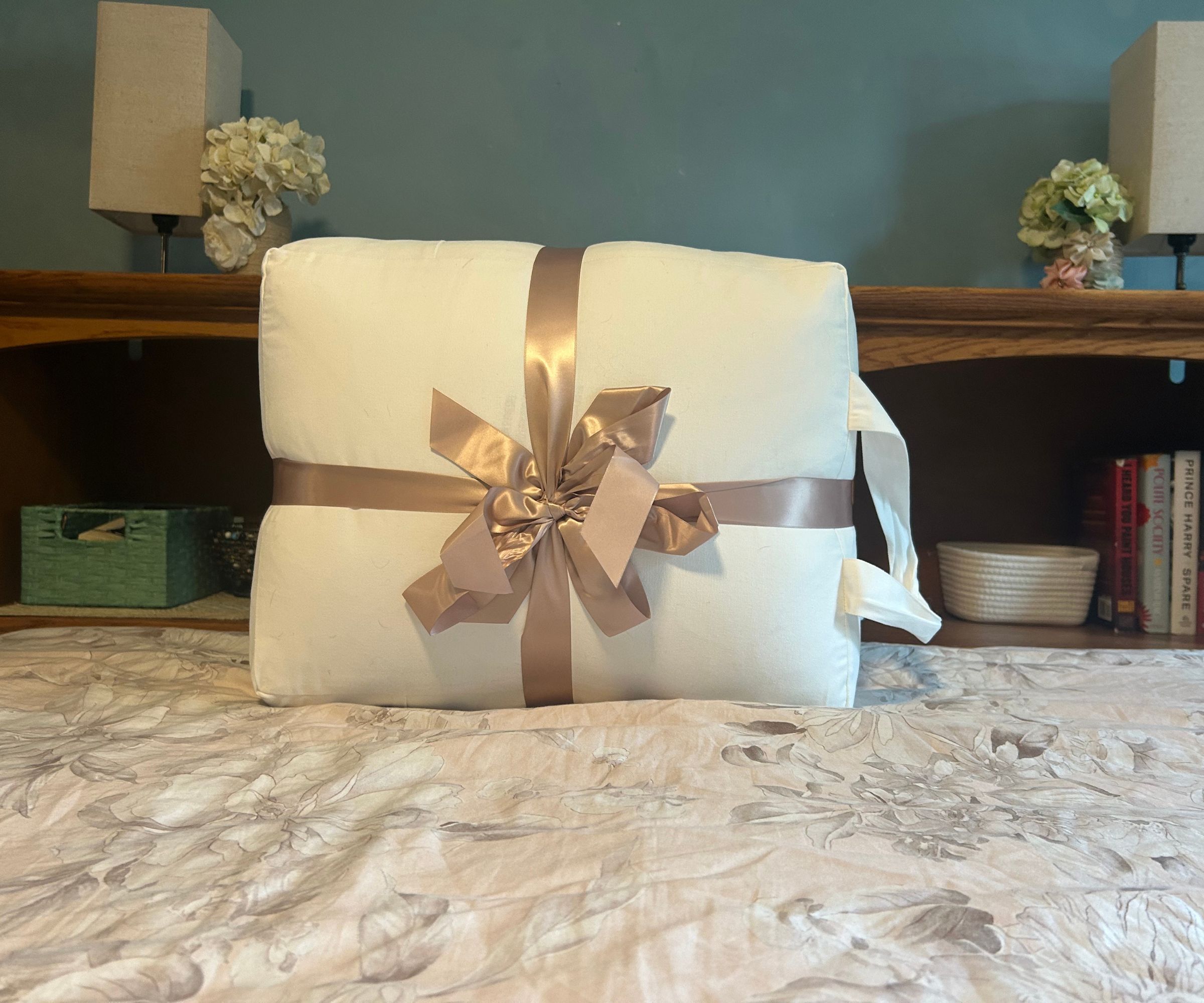
The Saatva Down Alternative Comforter comes in three weights for all seasons
The best materials for a winter duvet insert are either wool or down options.
The most luxurious duvet filling, down, is generally the most expensive. Loved for its cuddly properties and thick feel, it offers a great amount of insulation and warmth.
Wool is known for being naturally insulating, but also moisture-wicking, anti-bacterial, and durable, and will keep you cozy and last. Wool duvets also tend to be cheaper than down but have a flatter profile, which is something to consider if you love a thick duvet.
If you don’t want animal products? Many bedding brands use specially developed materials – such as polyester microfiber – that offer better heating properties than traditional duvet fillings.
Be sure to follow our guidelines on tog rating, above, for a winter design. You might want to go up by one size, too. For instance, if you have a queen mattress, a king duvet will work. There's more material to go around; your insert or comforter will drape further down the sides of your bed, keeping drafts at bay, and, if you share a bed, you're less likely to end up coverless during the night.
Duvet vs Comforter
A duvet comprises two detachable pieces. The insert is designed to be combined with a duvet cover, which is easy to launder and reduces the need to wash the duvet itself. Duvets tend to be more expensive as they're typically filled with higher-quality materials like down.
In contrast, a comforter is a single integrated item of bedding. They are typically more affordable as they usually have synthetic fibers and fills, although you can find comforters made from natural materials, too. They don't have detachable covers, so the look can't be changed. However, you could use a duvet cover if it fits. Washing involves putting the whole comforter in the drum, and it can be awkward and take a long time to dry because of its bulk.
Does a Duvet Need a Cover?
Since a duvet insert and a duvet cover are two different items of bedding, you might be wondering if a duvet needs a cover. The answer is not necessarily.
If your duvet insert is machine-washable, then you don't need to sleep with a duvet cover. You should wash your insert at least once every two months – sooner if you notice any stains or smells. If your duvet insert is not machine-washable, then you need a duvet cover to keep your bed and body clean from sweat, spills, and stains.
Duvet Buying Mistakes to Avoid
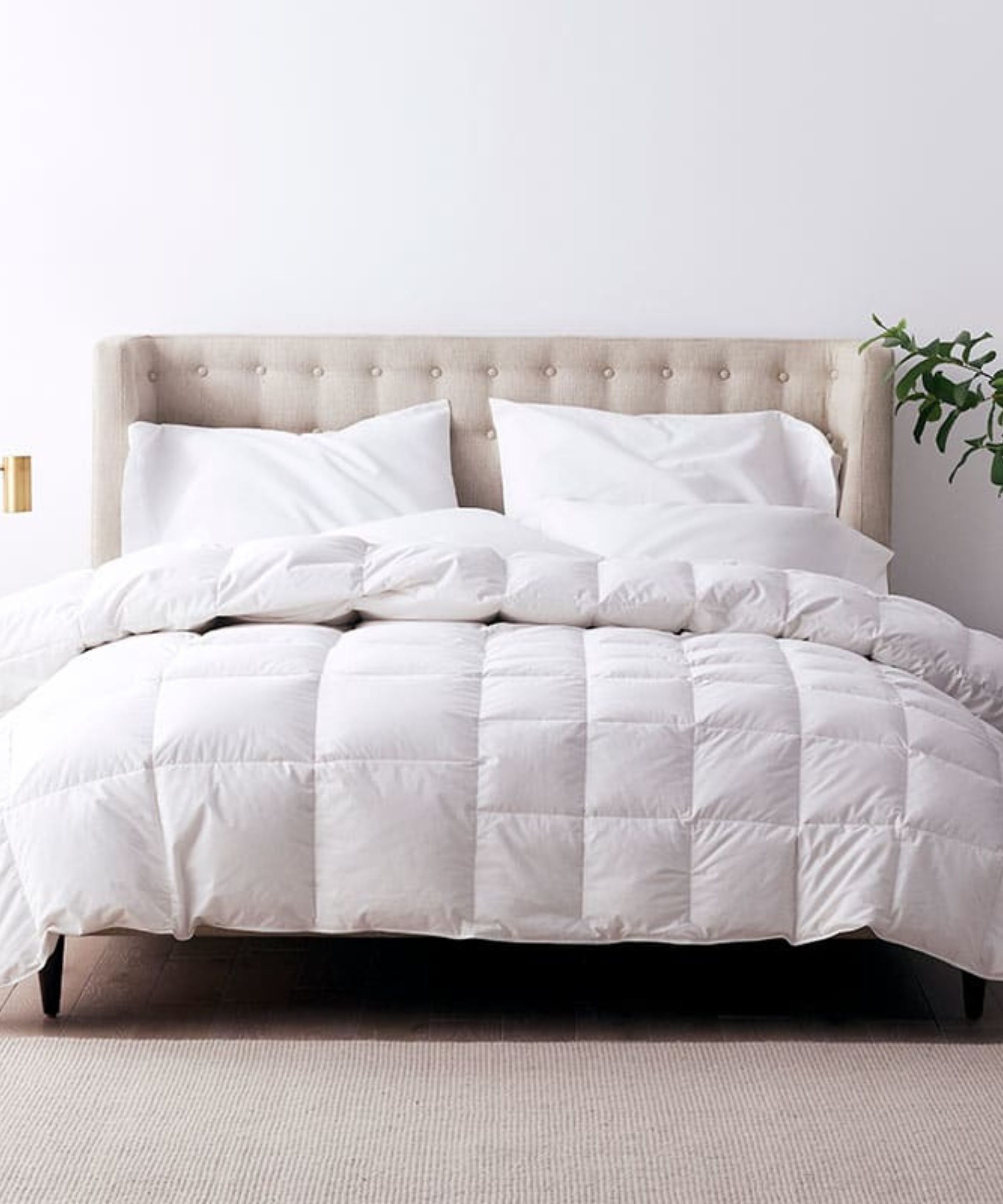
The Company Store offers a range of duvets in down and alternative fills
- Misunderstanding the terms: Be clear on the differences between a comforter and a duvet insert. They’re above, but the number one is a duvet is made up of two pieces, an insert and a cover, while a comforter is self-contained.
- Confusing fill types: Down refers to duck and goose fluff. It's the traditional filling for comforters and inserts because it holds heat to keep you warm, and because the tiny air pockets create natural loft. Down alternative includes microfiber and lyocell, which best imitate the look and feel of real down and wool.
- Ignoring your sleep style: If you have night sweats, hot flashes, or tend to run warm, you’ll need a cooling design. If you struggle to stay warm when asleep, consider a warming duvet insert or comforter. If you need to swap weights between summer and winter, you could invest in two designs or opt for an adjustable version with layers you can include or take out.
- Forgetting to budget: You should expect to spend at least $100, but luxury duvet inserts and comforters can cost more than $1,000. If you want to spend wisely, I'd recommend shopping at one of the specialist sleep stores. That way, you're paying for a product, not a brand name. Federal holidays tend to bring deep discounts or check out site-specific sales.
- Not shopping sustainably: The right design should stand the test of time, so it is worth investing in quality. As for the materials, look for down that‘s a mixture of virgin and recycled. Keep an eye out for reference to the International Down Standard (IDS), which indicates that your down is sustainably sourced and responsibly washed.
Duvet Care
Check the care label when considering a duvet insert or comforter to see how easy it will be to maintain its hygiene. Bear in mind that both can be bulky, so the capacity of your washing machine and dryer is as important as what the label says about cleaning.
If you’re choosing between wool and down fills, the former can be hard to wash as fibers may well clump together or shrink under the heat. Try a gentle cycle on a low heat, with a special wool detergent. However, the Woolroom’s managing director, Chris Tattersall, says, ‘Wool’s self-cleaning and antibacterial nature mean sunlight and fresh air will revitalise the fibres, with no need for additional washing, leading to a longer lifespan for your wool duvet.’
Down, meanwhile, ‘tends to absorb moisture, leading to clumping and loss of insulating power if not properly cared for or aired regularly,' according to Dr. Roger Washington, medical director of Sleep to Live Well Foundation. Follow the care label.
FAQs
When Should you Switch from a Summer to Winter Duvet?
For many people, switching between a summer and a winter weight duvet insert or comforter is necessary to stay at the right temperature when sleeping.
There isn’t a set time to make the swap. ‘You want to be feeling cool throughout the night before you make a change,’ says David Rubin, product expert at The Sleep Doctor. ‘If you wake up sweating or still need to sleep with an open window, that summer throw probably wants to stick around a little longer,’ he says.
What Duvet Inserts do Hotels Use?
Most hotels use goose-down duvet inserts. They're light and fluffy, suitable for all seasons, with plenty of loft to make a beautiful bedspread. If you're interested, I've interviewed top hoteliers and head housekeepers to work out: 'which bedding do luxury hotels use?'
What is an Antibacterial Duvet?
An antibacterial duvet is made with materials that inhibit the growth of bacteria. These could by synthetic, or a natural material like wool. It could also be treated with antimicrobial agents.
The benefit of an antibacterial duvet insert or comforter is that it slows or stops the buildup of bacteria that causes bad odors or skin irritation. An antibacterial design could also be hypoallergenic.
Once you've bought one of the best duvet inserts, it's time to dress the rest of the bed with some of the best bed sheets to suit every style of bedroom and budget. If you suffer from night sweats or waking hot, you may prefer some of the best Amazon cooling sheets to keep you comfortable through the night.
Design expertise in your inbox – from inspiring decorating ideas and beautiful celebrity homes to practical gardening advice and shopping round-ups.

Emilia is our resident sleep writer. She spends her days tracking down the lowest prices on the best mattresses and bedding and spends her nights testing them out from the comfort of her own home. Emilia leads a team of testers across America to find the best mattress for every sleep style, body type, and budget.
Emilia's quest to learn how to sleep better takes her all around the world, from the 3Z mattress factory in Glendale, Arizona to the Hästens headquarters in Köping, Sweden. She's interviewed luxury bedding designers at Shleep and Pure Parima, as well as the Design Manager at IKEA. Before she joined Homes & Gardens, Emilia studied English at the University of Oxford.
- Katrina Harper-LewisHead of Living
- Sarah WarwickContributing Editor